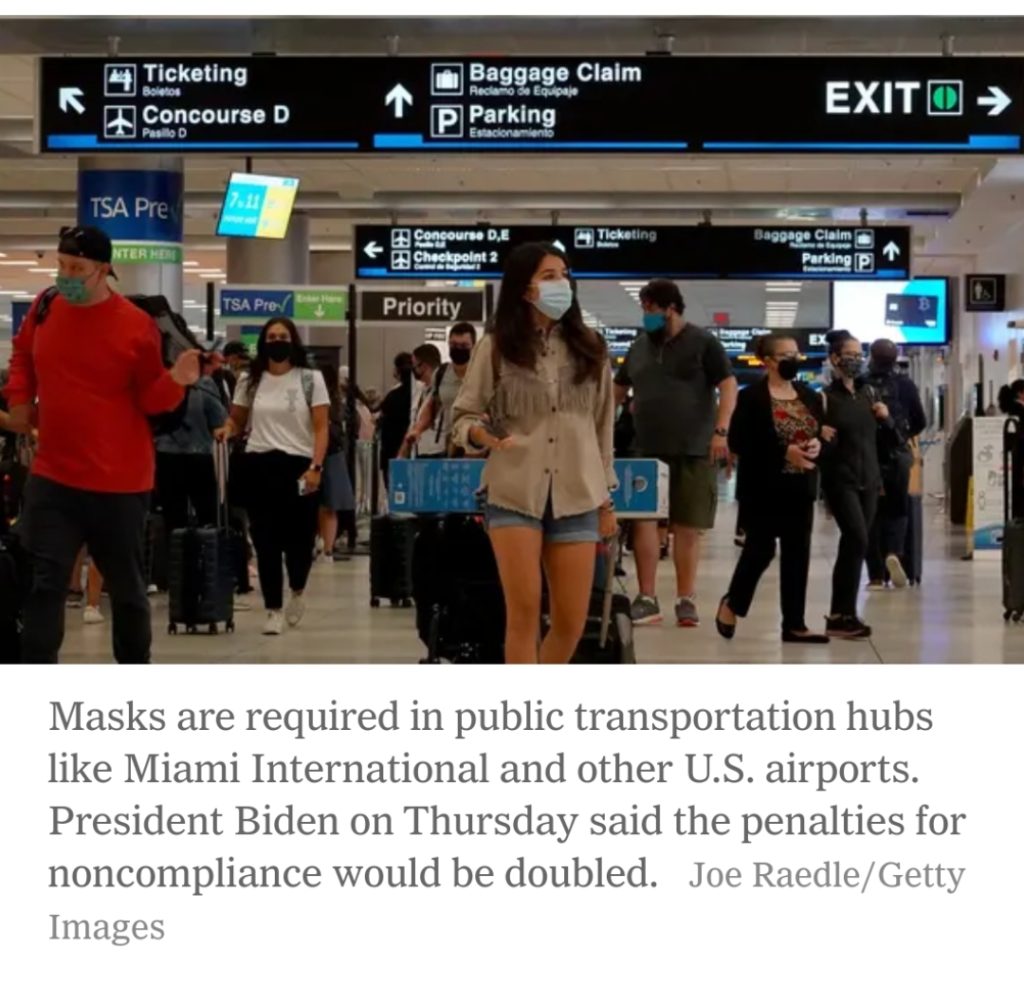On Thursday, in a wide-ranging speech outlining aggressive steps to curb the spread of the coronavirus, President Biden announced that the Transportation Security Administration would double fines for travelers who refuse to wear masks in airports and on commercial airplanes.
“If you break the rules, be prepared to pay — and by the way, show some respect,” Mr. Biden said, referencing the change in policy as well as the many incidents in recent months of rude passengers who refused to mask up on domestic flights.
As of Friday, penalties for first-time offenders have been raised to a minimum of $500. Second-time mask refusers may be fined as much as $3,000.
Many flight attendants and travelers responded enthusiastically online to the declaration.
But the announcement also raised a few critical questions, namely how enforcement of these fines works.
Since February, when the T.S.A. first announced that everyone — except children under 2 and people with some disabilities — is required, by law, to wear masks on airplanes and in airports in the United States, the agency has received more than 4,000 reports of mask related incidents, according to R. Carter Langston, a T.S.A. spokesman.
However, only 126 people have faced fines, he said.
Also, though one might come away from Mr. Biden’s announcement with the belief that T.S.A. officers at airports are responsible for fining noncompliant travelers, that’s generally not the case, said Becky Esquivel, a T.S.A. officer at the McCarran International Airport in Las Vegas and the vice president of the American Federation of Government Employees Local 1250, a union representing government employees at 12 airports in Arizona and Nevada. Though T.S.A. agents may ask people to put their masks on while screening their luggage at security, they do not have the ability to issue a ticket to someone who refuses on the spot. Nor do T.S.A. agents step onto airplanes, where many of the most tense mask encounters have occurred.
“We’re not the mask police,” Ms. Esquivel said.
So who are the “mask police?”
This depends on where someone is when they are not properly wearing a mask. The federal mask mandate applies not only to airports and airplanes, but also to trains, buses and other forms of public transportation.
At airport checkpoints, T.S.A. agents are supposed to remind people to wear masks, according to Mr. Langston, the agency spokesman. If those individuals flat-out refuse, the agent can deny them entry to the gate.
Typically, politely asking people to pull up their masks or cover their noses correctly does the job, Ms. Esquivel said, perhaps because it’s clear that if they break the rules at that point they are not getting anywhere near their flight.
Beyond the checkpoint area, however, T.S.A. agents are no longer involved in mask enforcement. If someone is waiting in a crowded boarding area without a mask, the responsibility falls to local law enforcement and airport employees to intervene, according to Mr. Langston.
Once passengers board their plane, the flight attendants are supposed to be the enforcers of mask rules. Flight attendants do not decide if someone is fined; they are simply tasked with encouraging that person to put a mask back on and then deciding whether to report the incident if the passenger does not comply.
Flight attendants don’t have a direct line to the T.S.A. or the F.A.A., the two agencies that can decide whether to impose a fine, said Sara Nelson, the international president of the Association of Flight Attendants-CWA. Typically, they report the incident to someone on the flight deck, who reports it to an air traffic controller on the ground, who reports it to a supervisor who may report it to the T.S.A. or the F.A.A., as well as to the law enforcement body in charge of that particular airport, depending on the nature of the incident.
“It can break down anywhere along the way,” she said.
Ms. Nelson applauded Mr. Biden’s statement about the increased fines, as it signaled to passengers that they must wear masks and respect flight attendants, and because it encouraged the people involved in the reporting process to take these incidents seriously.
Who decides when a complaint becomes a fine?
Once a complaint has been filed, compliance staff members working for the T.S.A. evaluate the incident and determine the penalty, Mr. Langston said. They examine such details as how many times the passenger was told to wear a mask and how the passenger responded to the reminder.
Simply forgetting to place a mask back on after eating — then putting it on as soon as a flight attendant says something — is not likely to lead to a fine, for example. Responding by assaulting the flight attendant — which has happened, Mr. Langston said — would lead to the most severe T.S.A. fine: $1,000 for a first-time offense or $3,000 for a second time.
The agency then notifies the person, by mail, that he or she is facing a civil penalty for violating the federal mask mandate. Somewhat like a traffic or parking violation, the traveler can choose to pay the total, which is due immediately, or request a hearing with a T.S.A. adjudicator or an administrative law judge, where the traveler can fight the mask ticket, Mr. Langston said.
He declined to say whether anyone had gone to a hearing so far, but noted that the process could take several months.
The F.A.A. has its own penalty system. As of Sept. 7, the agency said it had received 3,057 reports of passengers refusing to comply with the federal mask mandate. The agency’s lawyers review reports that they receive from airlines to determine whether they meet their legal criteria for interfering with the duties of a crew member. So far this year, the F.A.A. has proposed civil penalties or fines in 153 incidents, it said, but not all of those incidents involved masks.
Why is mask use mandated even for vaccinated people?
Just because a person is vaccinated does not mean that they cannot transmit the coronavirus to another person, said Dr. David Freedman, a professor of infectious diseases at the University of Alabama at Birmingham. If the other person is also vaccinated, the chance of getting severely ill is greatly diminished, but a vaccinated person may transmit the virus to an unvaccinated individual.
“The bottom line is that vaccinated people can still be very contagious,” he said.
This is particularly true since the Delta variant came along. And so if people want the pandemic to end sooner rather than later, Dr. Freedman said, they need to mitigate the spread of the virus in high-risk crowded indoor spaces, which means wearing masks on planes and in airports.
By Heather Murphy/The New York Times





